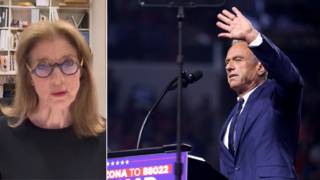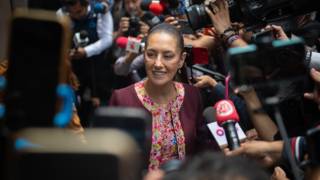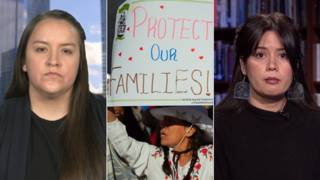
Related
In Lebanon, tens of thousands of people have turned out for the funeral of prominent anti-Syrian publisher and lawmaker Gibran Tueni. Tueni was killed, along with three others, in a massive car bomb in Beirut on Monday. The blast came just hours before a UN inquiry team said it had fresh evidence to reinforce earlier findings of Syrian involvement in the assassination of former Lebanese Prime Minister Rafik Hariri. We go to Beirut to speak with veteran Middle East Correspondent Robert Fisk. [includes rush transcript]
Crowds of mourners–many waving the Lebanese flag–followed the coffin as it was carried slowly through the streets of the capital.
Tueni was killed, along with three others, in a massive car bomb in Beirut on Monday. Tueni is a Christian member of parliament who also edits the top selling An-Nahar newspaper. He had only returned to Lebanon on Sunday from Paris, where he has been staying most of the past few months out of fear for his safety. His death marks the third political killing since former Prime Minister Rafik al-Hariri was killed in February.
Many in Lebanon have blamed Syria for Tueni’s killing–a charge the Syrian government was quick to deny. The blast came just hours before a UN inquiry team said it had fresh evidence to reinforce earlier findings of Syrian involvement in Hariri’s murder and obstruction by Damascus in the investigation.
Detlev Mehlis, who has headed the U.N. probe for seven months, said that cooperation with Syria had improved but he was not sure it would continue.
Mehlis has implicated Syrian and Lebanese security officials in the murder and identified six Syrians as suspects. The Security Council also considered a resolution that France, the United States and Britain are proposing to extend the Hariri probe, which ends on Thursday, for six months.
- Robert Fisk, chief Middle East correspondent for the London Independent. He has lived in Lebanon for many years and is author of “Pity the Nation: The Abduction of Lebanon. His latest book is titled “The Great War for Civilisation: The Conquest of the Middle East.”
Transcript
JUAN GONZALEZ: Detlev Mehlis, who has headed the U.N. probe for seven months, said that the cooperation with Syria had improved, but he was not sure it would continue.
DETLEV MEHLIS: It has been after much hesitation and procrastination that the Syrian authorities finally agreed to move on the request to interview five Syrian officials, whom the commission considers as suspects in Vienna under conditions determined by the commission. This took place only a week ago. At this rate, the investigation may take another year or two. Cooperation and good faith should be diligent and timely.
JUAN GONZALEZ: Mehlis has implicated Syrian and Lebanese security officials in the murder and identified six Syrians as suspects. The Security Council also considered a resolution that France, the United States and Britain are proposing to extend the Hariri probe, which ends on Thursday for six months. We go now to Beirut, to speak with Robert Fisk, chief Middle East correspondent for the London Independent. He has lived in Lebanon for many years and is author of Pity the Nation: The Abduction of Lebanon. His latest book is titled, The Great War for Civilization: The Conquest of the Middle East. Welcome to Democracy Now!, Robert.
ROBERT FISK: Hi. Thank you.
JUAN GONZALEZ: Tell us a little bit about this latest bombing and also a little bit about Mr. Tueni himself, his career and why there might be a suspicion of Syrian government involvement.
ROBERT FISK: Well, I think it’s probably more than a suspicion. It’s pretty much conviction in Lebanon of Syrian government involvement — although I wouldn’t say Syrian government — Syrian intelligence involvement. Gibran Tueni was the son of one of the great statesmen of Lebanon who is still alive. Indeed, I saw him this morning walking, a broken figure, through the crowds at the funeral. Ghassan Tueni, a former Lebanese ambassador at the United Nations, owner of the An Nahar newspaper, which his son edited, who indeed won the Legion d’Honneur in Paris only five, six days ago. His son was present in Paris for that award to his father.
Gibran Tueni was a man who could be a very arrogant politician. When General Michel Aoun, a rather spent figure in Parliament now, fought a hopeless war of liberation, as he called it, against the Syrians back in 1990, Gibran Tueni was his spokesman and made many extremely sectarian and brutal comments at the time, but had reformed himself into a modern westernized politician, but had returned to Lebanon extremely vociferous against the Syrian occupation, Syrian presence, military presence, intelligence presence in Lebanon, and who had become a very prominent member of the Lebanese Parliament, in demanding an end to Syrian influence over Lebanese affairs.
He was probably one out of four or five of the principal figures here, who most Lebanese and me, too — I mean, I live here — would have said was on the hit list of Damascus. And most people believe that the hit list lost one more figure, one more name on it, when he was blown up. In an almost word-perfect type car bombing on a mountain hillside in Mokallis, I went to the scene very shortly afterwards. There were bits of him and other people all over the road, a narrow mountain road that he would not have told anyone but his closest compatriots he was traveling on, a road he regarded as secure. There was a car bomb waiting for him at a corner of the road that blew his own vehicle clean through the railings and down a ravine among palm trees and pine trees, where it was burning when I arrived. So, clearly, an expert, a political killing, almost certainly what we call a line of sight killing. In other words, the murderer must have been hiding on the roof or in the upper floors of a building in the surrounding area, close enough to see in a moment when his car passed to press the button, and far enough away not to be killed by flying glass or wounded by concrete blasting in.
His death is universally attributed in Lebanon to the Syrians, or at least, let us say to the Syrian intelligence service of the Ba’ath Party in Damascus, not necessarily to the president himself, Bashar al-Assad. It was interesting that this morning at the funeral a few hours ago, where I was present, when Walid Jumblatt, the Druze leader, who probably will be the new number one on the hit list, if he wasn’t already, a brutal critic of Syria, and not without reason, since he believes, I think, correctly, the Syrians murdered his father more than well over 20 years ago, he turned around on his own supporters and told them to stop shouting obscenities about the president of Syria, as he walked to the funeral this morning.
So, you know, we have a situation where we have a very prominent Christian — Greek Orthodox, not Maronite — politician murdered, at a time when many people thought, because of the U.N. report, that the murderers of Lebanon, the people who are killing off Syria’s enemies here, would have gone underground, would have gone to their lairs. In fact, they’re still, obviously, on operational duty, and you know, there was a big poster was waving above my head at one point in the funeral cortege that said “Who’s next?” And we are all asking that, of course, here.
JUAN GONZALEZ: And at the funeral, in terms of the public response, how does it compare to the initial protests after the Hariri assassination and —
ROBERT FISK: Yeah, well we all compared it to that, of course. And, you know, Gibron Tueni was not Rafik Hariri. He didn’t have the charisma, the power, the money, the position he might have had as the years went by, but he didn’t have that. So, no one expected, you know, the million-strong protest. But I was surprised to find how many tens of thousands of people turned out to see him, his coffin, very light, as there wasn’t much left of him, frankly, taken to the church in the Place de l’Etoile in the center opposite the Parliament building, where, of course, he was himself a member of Parliament.
It was very interesting to see Fouad Siniora, Hariri’s old friend, who is now the Prime Minister, and who was abused over the weekend by President Assad of Syria, walking from the Parliament building alone amid the crowds with his hands in the air like a prize fighter, saying, in effect, you know, ’I’m here. I’m not going to run away from Lebanon.’ But people were very frightened. There was a lot of soldiers, a lot of troops, security, plainclothes policemen, and so on. Great fear of bombs in the crowd, of course, as usual on these occasions. But the Lebanese, rather savvy, they know how to do funerals well. At the last moment, as the coffin was carried by the soldiers, they presented arms and the band struck up the last post, and so on.
But a lot of people, a lot of young people in Lebanon who had come back here and were prepared to stay on after Hariri’s murder, and who had said we’ll stay on and run this country, whatever the Syrians or the Israelis think, are talking now and were talking to me this morning, amid the funeral, of leaving. They have had enough. That’s the most tragic thing about this, that each killing that happens, you know — we had Hariri’s death, and we had the murder of Samir Kassir, a prominent anti-Syrian regime journalist, and we had the killing of the former head of the Communist Party, George Hawi, and then we had the attempted killing of May Chidiac, a journalist, a lady, woman journalist who worked for Lebanese television, and now we have had the killing of Gibron Tueni.
JUAN GONZALEZ: We are talking with Robert Fisk, a chief Middle East correspondent for the London Independent. I’d like to ask you about a report in the Financial Times that says Bush calls on U.N. to step up pressure on Syrian pressure. President Bush, calling on the U.N. Security Council to maintain the pressure on Damascus after the Tueni assassination. Your response, and also about the U.N. report, the extension of the U.N. report?
ROBERT FISK: Yeah, well, you know, the great concern about many people in Lebanon is that they want the U.N. to act over Hariri’s death. They want to see the Syrians brought to book, if they are to blame for Hariri’s death. They don’t want America to be riding the horse for them. America is seen in Lebanon not as the savior of Lebanese democracy, but as the best friend of Israel, which is not necessarily the best friend of Lebanon. So, there’s considerable dual feelings here. On the one hand, they realize they need the United States to support the Security Council’s actions over Syria; on the other hand, they don’t trust the United States. And this is a fairly across-the-board feeling among Christian Maronites, Druze, Muslim Sunnis, Shiites. America, throughout the Middle East, is not a trusted nation.
So, you know, in one sense, it would be much better for the Lebanese if Bush did not speak about Syria, but it is in his nature to do so, in his policy to do so, and those of his rightwing neoconservative advisers to do so. Nothing will stop him, but Bush is seen more as, in Lebanon, more as a — I’m trying to think of the right word to use — more as a person who is diverting attention, rather than maintaining the pressure on Syria. But I realize that’s not how it’s seen in New York or Washington, of course.
JUAN GONZALEZ: And the extension of the U.N. investigation?
ROBERT FISK: Well, you know, a lot of people believed, not without reason, because Mehlis virtually said the same, that he, Mehlis, would be able to tie this whole thing up by Christmas, and he clearly has not been able to do so. And this is partly — I mean, he clearly blames the Syrians, I think not without reason, for a considerable amount of procrastination. At the same time, it’s fairly obvious that certain witnesses have been got at, as they used to say in the movies, got at by the Syrians and made to disclaim their original evidence. And this has obviously slightly undermined Mehlis’s work, on the grounds that he, for example, certainly ordered some arrests on the basis of evidence, which has now been taken back by the witnesses; again, I say, after Syrian officials have visited the families of witnesses. So, you can imagine the sort of intense, dramatic and dangerous world in which the investigators for the United Nations, including Mehlis, are operating.
And, of course, you can also realize that if people can reach out and kill someone like Gibron Tueni, they can also reach out and kill U.N. officials, too, and their translators and their witnesses. So, people are operating and working here in a very dangerous environment. When I named the first four suspects in the Lebanese security forces, men who were clearly working for Syria, into Hariri’s murder, a general on the listening department, the ecouteur department of the Amn al-'Am, the security services in Lebanon, called General Tfayleh, immediately put a tap on my home phone, the one you are talking on now, 37615. And I immediately wrote a story in my newspaper saying he put a tap on the phone. But, you know, this is the degree to which we live in this country now, that, you know, the moment you get close to the people who obviously were involved in murdering Hariri, you are listened to and watched, and in this part of the Middle East, that's obviously something you want to be careful of.
JUAN GONZALEZ: Well, we’re talking with Robert Fisk on his tapped phone from Beirut, and the Middle East correspondent for the London Independent, and we’ll ask you, Robert, to stay with us, because we’re going to be moving in our next segment to talk about Iraq, and we’d like you, if possible, to stay with us.












Media Options